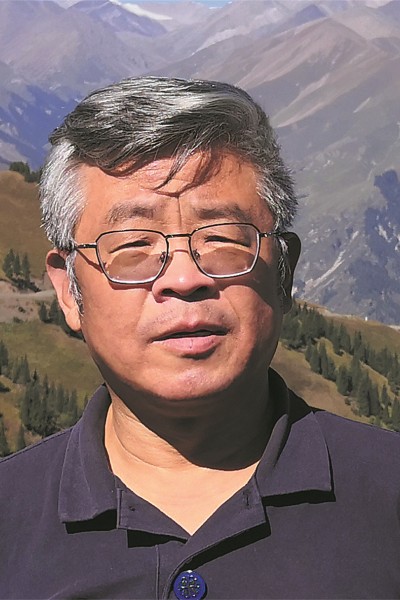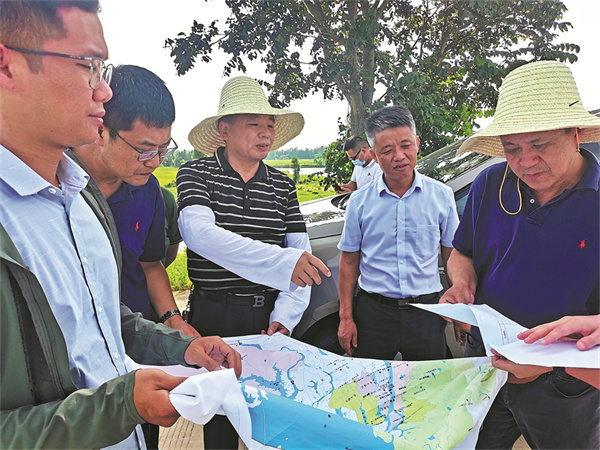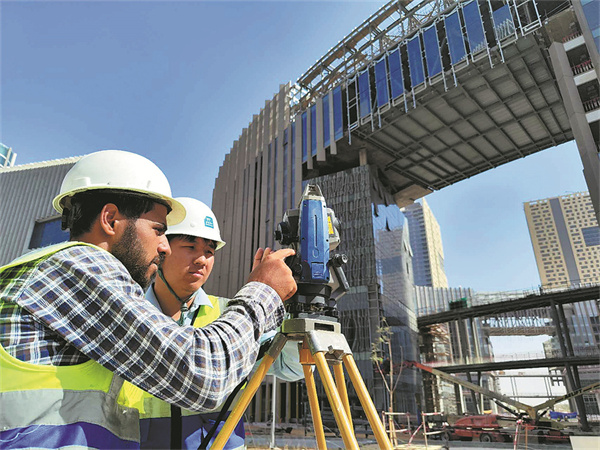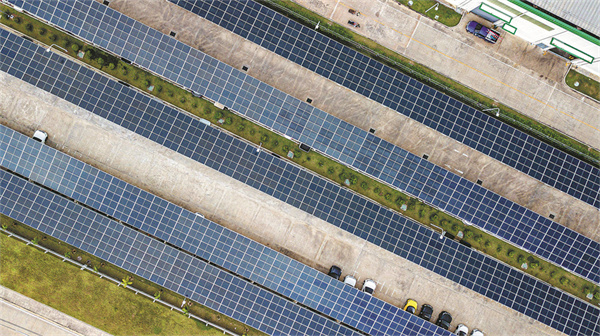Advisers diligent in shaping environmental policy
Proposals aim to have tangible impact on people's daily lives, international cooperation

Boats ply a waterway in an ecological scenic area in Changzhou, Jiangsu province, in December. [Photo provided to China Daily]
Gu Shuzhong, a national political adviser and environmental policy professional, had already submitted five proposals to this year's two sessions before the annual political event opened on Monday.
His proposals focus on environmental governance and green development, including suggestions for further improving the river and lake chief system — in which government heads are designated to be in charge of protecting water bodies within their jurisdiction — and accelerating the establishment of an interprovincial compensation mechanism for the production and sale of grain.

Gu Shuzhong, a national political adviser and environmental policy professional. [Photo provided to chinadaily.com.cn]
Gu's suggestions are based on research and investigation in the past year while serving as a member of the 14th National Committee of the Chinese People's Political Consultative Conference, the country's top political advisory body.
As integral players in multi-party cooperation and political consultation under the leadership of the Communist Party of China, CPPCC members serve as advisers for government, legislative and judicial organs, and are tasked with putting forward proposals on major political and social issues.
About 2,100 national political advisers will gather in Beijing on Monday to attend the annual conference, along with that of the National People's Congress, the top legislative body, making up the two sessions.
Last year, the CPPCC National Committee added a new group focused on the environment and natural resources, consisting of professionals and officials in related fields.
It was the first time a new group had been launched by the top advisory body since a group focused on economics was added in 1993. In response, many provincial CPPCC committees also launched their own groups to focus on the environment and natural resources.
Gu, a senior research fellow from the Institute of Resource and Environmental Policy of the Development Research Center of the State Council, said the move reflects the central leadership's attention to the issue.
At the National Conference on Ecological and Environmental Protection held in Beijing in July, Xi Jinping, general secretary of the CPC Central Committee, stressed that the coming five years will be critical to the building of a "Beautiful China".
Xi, who is also China's president and chairman of the Central Military Commission, said the country should make remarkable achievements in building a Beautiful China, support high-quality development with a high-quality ecological environment and accelerate the advancement of modernization featuring harmony between humanity and nature.
He said the committees of the CPPCC at all levels should intensify efforts to conduct special consultation and democratic oversight in boosting ecological conservation.
Ding Xuexiang, a member of the Standing Committee of the CPC Central Committee Political Bureau and China's vice-premier, urged political advisers to leverage their professions while taking part in a group meeting of advisers from the environment and resource group during the two sessions last year.
He underscored the need to accelerate socioeconomic development with a comprehensive green transformation, proactively and steadily work toward the targets of carbon dioxide peaking and carbon neutrality, enhance capacity to ensure the supply of key energy resources, and sort out prominent ecological and environmental problems that directly affect people's lives.

Political adviser Wei Yuansong (right) conducts field research at Poyang Lake near Nanchang, Jiangxi province, in July 2022. [Photo/China Daily]
New focus
Gu said in recent years China has achieved historic, comprehensive and pivotal accomplishments in environmental governance. Looking to the future, whether it is green, low-carbon development or the construction of a Beautiful China, there are still many challenges and difficulties that require political advisers to provide suggestions.
With 85 members, it is the ninth-largest of the 34 participating groups in the 14th CPPCC National Committee. The members' professional backgrounds include ecological environment, natural resources, water projects, urban planning, forestry, meteorology, transportation, chemistry and law.
About 40 percent are government officials, including Huang Runqiu, minister of ecology and environment, Zhang Jianhua, director of the National Energy Administration, and officials from the Ministry of Water Resources and the Ministry of Natural Resources.
Some 30 percent are experts and scholars in related fields, including university presidents, directors of research institutes and academicians from both the Chinese Academy of Sciences and the Chinese Academy of Engineering.
In addition, about 20 percent of the members work for energy and chemical companies, including China National Nuclear Power, Sinochem Holdings, State Grid and China Rare Earth.
Gu said bringing these high-ranking officials, senior executives and experts together allows for in-depth exchanges from the perspectives of management, operation, academia and more, giving them the opportunity to truly complement each others' strengths.
"As a scholar, I have learned a great deal from those officials and executives, helping to make my proposals and suggestions more practical," he said, adding that over the past year, he has participated in several research and consultation meetings, covering topics such as a mechanism to realize the value of ecological products, and a recycling and utilization system for the green energy industry.
Members in the group have focused on how to achieve both economic prosperity and environmental sustainability — that is, how to simultaneously or collaboratively achieve high-quality development and high-level protection, he added.
Wei Yuansong, a member of the National Committee of the CPPCC, who focuses on water pollution control technology at the Research Center for Eco-Environmental Sciences, Chinese Academy of Sciences, said the professional team helps enable the CPPCC to better carry out its work and provide support for the country's construction of an ecological civilization.
Last year, Wei and other members participated in several major research projects, all led by leaders of the CPPCC, involving national water networks, ecological protection in the Yangtze River Economic Belt and other important national plans.
Following these research projects, the members jointly authored reports that were provided to relevant decision-making departments for reference and some of the suggestions were also incorporated into relevant documents, he said.
Last year, members of the environmental and resources group submitted over 160 proposals to the CPPCC National Committee, and they delivered speeches at consultative sessions and meetings attended by government officials.
Additionally, they submitted more than 200 pieces related to public sentiment and social information and participated in inspections, research projects and instances of democratic supervision, according to the CPPCC National Committee.

Chinese and Egyptian builders work together to measure a building under construction in the central business district in New Cairo, the African country's new administrative capital area, in December. [Photo/Xinhua]
Global influence
Both Gu and Wei said climate change and its mitigation are global concerns that no country can afford to ignore and represent a significant area for collaboration.
Gu said unlike politics, economics, culture and technology, climate governance is a common topic for many countries, particularly for cooperation between China and the United States, as well as between China and Europe.
China has been actively participating in global climate governance, notably by setting clear goals to reach peak carbon dioxide emissions before 2030 and achieve carbon neutrality before 2060.
"This commitment marks the first time a developing country has set a clear schedule for peaking emissions and achieving carbon neutrality," Gu said.
Through a series of policy documents, China has outlined a roadmap and even detailed plans for achieving these targets, demonstrating that China's efforts to address climate change are not merely rhetoric but are being translated into action, he said.

Photovoltaic panels generate electricity at a Sino-Thai joint venture project in Chonburi province, Thailand, in November. It is Thailand's largest photovoltaic project to be installed on top of a factory building. [Photo/Xinhua]
"China's ambitious carbon plans have received strong recognition and support from the international community," he added.
Gu said both cooperation and discord exist between China and the US in global climate governance. Fundamentally, this reflects the differences and even conflicts between developed countries represented by the US and developing countries represented by China, particularly regarding their respective responsibilities in addressing climate change.
"This is a normal phenomenon. It is essential to engage in both cooperation and contention, contributing significantly to addressing global climate change," he said.
Due to the presidential election in the US this year, there is a possibility of further changes or even reversals in US climate and energy policies, Gu said, adding that it is necessary for China to pay attention to this and adjust strategies promptly while steadfastly adhering to established goals and pathways.
However, cooperative efforts to address climate change have become a cohesive factor in the relationship between China and the US, he said.

Whooper swans feed at the Rongcheng Swan National Nature Reserve in Shandong province in January. [Photo provided to China Daily]
Since 2014, Wei has worked to provide scientific and educational assistance for the Belt and Road Initiative. "Over the years, this work has made me realize that developing countries are eager to improve their ecological environment," he said.
"Through learning, research and investigation into China's experiences in ensuring the safety of drinking water, developing nations have recognized that our country's practices and experiences are worth learning from," he said.
In recent years, Beijing has engaged in international scientific and technological cooperation with the US, the European Union and other countries on sponge city construction, Wei said.
Sponge cities have planning and infrastructure aimed at preventing flooding, and increasing water storage.
"This collaboration has not only enhanced the capability and level of sponge city construction but has also made other countries increasingly recognize the value of Beijing's experience in the field," he said.
Meanwhile, developing countries involved in the Belt and Road Initiative are undergoing rapid urbanization, particularly in tropical regions, where urban stormwater control and risk management are facing increasingly severe challenges and require assistance, he added.
Wei suggested that Beijing fully utilize its position and advantages as a hub for international exchange and science and technology innovation to promote its experience in sponge city construction in developing countries involved in the BRI.









